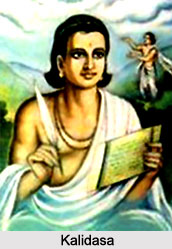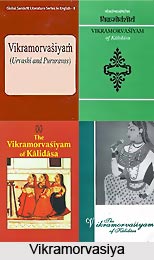 Indian literature perhaps seizes the most sublime attention, owing to its most ancient and pre-historic approach by religious thinkers and spiritual believers. Time and again it is said that literature in India represents that body of artistic works, which were both oral and written, depending upon the ages that had passed till the contemporary times. However, it is not also that the beginnings of Indian literature had been pushed all by itself. Indian literature is warmly wrapped up with the Indian religious system. The earliest sacred writings are the Vedas. It is certainly not an overstatement to say that one of the primary influencing factors on Indian literature since ages is, religion.
Indian literature perhaps seizes the most sublime attention, owing to its most ancient and pre-historic approach by religious thinkers and spiritual believers. Time and again it is said that literature in India represents that body of artistic works, which were both oral and written, depending upon the ages that had passed till the contemporary times. However, it is not also that the beginnings of Indian literature had been pushed all by itself. Indian literature is warmly wrapped up with the Indian religious system. The earliest sacred writings are the Vedas. It is certainly not an overstatement to say that one of the primary influencing factors on Indian literature since ages is, religion.
The whole course of Indian literature and in a broader sense the course of Indian civilization was influenced largely by the concept of devotional worship of a personal deity. This very influencing factor to a great extent structured a cult era in Indian literature whilst giving rise to the historical development of the Bhakti movement. Just not the religion, Indian philosophy, Islamic tradition and indeed the Dravidian culture all were once the influencing factors which determined the silhouette of Indian literature. The French, British, Dutch, Portuguese, and English also influenced the dominant Sanskrit tradition, thereby influencing the Indian literature to a great extent. The influencing factors on Indian literature since ages have molded and reshaped Indian literature.
Factors which Influenced Literature In Ancient India
The incredible influencing factors on Indian literature pertain to those subjects which has enlivened writers from time immemorial. Right from the Vedic Period, as can be very well comprehended from Sanskrit literature, socialistic factors influenced the Indian literature a lot. . Indeed, it can be stated that social influence on Indian literature is one such domain, which can perhaps never be ignored or overlooked at any time. The society and its social beings is an integral portion of any literature, which forever is mirrored in every writer`s creation. The surroundings have over and over again been recognised as a personified being in Sanskritic literary influences in literature from India. Works like Ritusamhara or Vikramorvasiya by Kalidasa verily depicts that society in erstwhile Indian times, times when India was still fondled by lores and its majestic or mythical kings. The ancient period in India indeed was a melting pot of rendering superlative influences on Indian literature, primarily the socialistic or majestic influences, basically performed by writers to appease the royal household with their dedicated works.
Ancient times in Indian literature, precisely of the 7th or 10th centuries had also remained spectator to the arrival of Buddhism, Jainism and other linguistic influences, which were however, not although as potential as Hinduism. As such, the Bhakti influence of Indian literature with Meera Bai, Buddhist influence on Indian literature with Gautama Buddha, Jain influence on Indian literature with Vardhamana Mahavira and the dazzling linguistic influence on Indian literature that had come with it, was incredibly focused on to making literary overlapping a matter of much ease and poise. The indelible and verdant mark that was noticed side by side with Sanskrit literature and its influence in the Indian literature culture was that, the country was awaiting in bated breath of its subsequent arrival of the influential majesties and luminaries to come for Middle and Colonial culture.
Factors which Influenced Literature In Medieval India
The arrival of Middle Ages, i.e., the Medieval Period in India, had to very much stay witness to and rely upon the overwhelming and new advent of Islamic culture in the Oriental soil. The Middle Ages was also one period in India, which not only did impact the literature as a whole, but also the whole essential indigenous Indian set-up. The previous period was one, which was thoroughly identified with the Hindu religious and Hinduism rising more towards peak excellence. However, broader and more extensive influence on literature from India was one that had been scripted during the Medieval Indian times. This redefines that era, which witnessed, for the very first time that Indian regal rulers could also succumb to alien incursions, those coming from the corners of Persia, Turkey, or even the European voyages to chart a world map. As such, an uncanny amalgamation was noticed with Muslim and European mixtures of culture, which also brought in literatures and languages from Persia, in the form of Urdu and its consequent brilliant after-effects. Influences on Indian literature also were furnished with the option of a kind of dichotomy to hand-pick from the beneficial or the malicious influences on the literary write-ups. However, intelligent enough as the writers were from medieval India, they chose to select the beneficial ones to give life to memorable pieces. The Muslim era upon India, with the Delhi Sultanate and the later most esteemed Mughal Empire, can be blindly named the masterminds, under whom the Indian cultural ethos expanded to its most stretching extent. Not only Urdu literature, but every other Indian indigenous literature was lent an impetus under the hands of the Sultanate or the good-hearted Mughal emperors. As such, such extolling and respected influencing factors on Indian literature can never be dismissed, which are perhaps only available to the contemporary Indian natives only in picturesque format.
 Factors which Influenced Literature In colonial and post colonial India
Factors which Influenced Literature In colonial and post colonial India
The colonial period, which was at first dealt with much subtlety and humour in the literal sense, did take on many momentous and grave proportions due to the British Raj and its cruel domination. In fact, European arrival on Indian soil was one such aspect, which had begun already during the times of Mughal Emperor Jehangir. Yet, British domination, beginning with the East India Company perhaps had surpassed every other literary influence on Indian literature, with 200 years of ruthless reigning. Be it the Company or the later British Empire under the Crown annexation, Indian literature never did remain the same again. Indian regions were turned into provinces and the leading port cities, into Presidency administration. Each of the administrational system was overhauled, which began to gradually make a profound impact upon the mass and the class alike. The cultural ethos, the cultural distinctiveness that India owned, was completely shattered owing to English power and ascendancy. This no doubt was to make its shielding as well as protesting a mark in regional Indian literature, which again was a societal duty for any author. Cultural influence on Indian literature was mostly viewed in the limelight, with writers attempting to at times make headway for nationalists, or, the others, supporting the beneficial cause of the rare-to-find kind-hearted Englishman. Whatever was the case, Indian literature was tremendously influenced from its every single angle of advancement.
Yet another path breaking aspect was the arrival and permeation of English language was a major means of communication for the class first, and later, the mass. Those kind-hearted Englishmen, who had taken the task upon them to bring natives to justice, had planned to create special position in native heart, by spreading English language and literature into every Indian soul. As such, one of the main influencing factors on Indian literature was the English language. English language thoroughly had influenced the Indian literature. Colonial influence in Indian literature was so much an aspect of everyday basis, that after some time, neither the ruler nor the ruled were very much taken in by it. If India was made a colony under British Empire, it was very very much obvious that colonialism would make its everlasting influence upon any kind of literary work from Indian nationals, be it in English, or be it in the regional languages. However, a distinct thin line still remained between these `ruler-ruled` relationship, in terms of communication, with the latter forever trying effectively to root out the former. And this very element very much became a reality in 1947, with India gaining Independence after 200 years of merciless suppression!
The sudden darkness and lack of light that was felt with the Partition of India, intensely had impacted upon any quintessential Indian, mirrored very much in the then-framed `Indian Diaspora` and its cluster of writers and authors. Post-colonial influence on Indian literature is that very sphere, which can still be viewed in the Indian English literature, not forgetting the sporadic regional literatures of 21st century. The abstract anxiety of helplessness, the angry young man restlessness, or the masked features of any Independent Indian human mind is still perfectly intact in the core of Indian literature, which however has taken towards fresh directions under the gradually arriving globalisation and its influence onto Indian literature.













